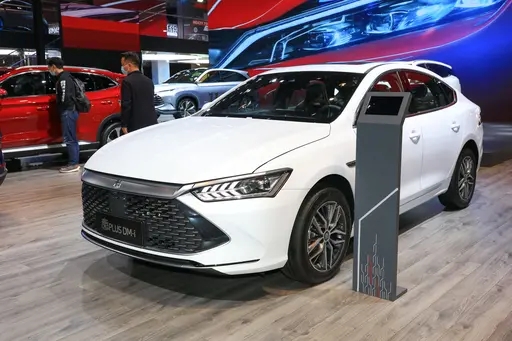Author:MarwenDate:2023-7-21

The Bloomberg News website published a report titled "How China Beats Everyone to Become the World Leader in Electric Vehicles" on July 17, compiled as follows:
In the race to cut carbon emissions, countries from the United States to New Zealand are rolling out incentives to stimulate electric car sales. China, which has become the world's largest electric vehicle market, has used these same strategies for years.
Beijing's success has been astounding. Electric cars accounted for a quarter of total passenger car sales in China last year, far exceeding the share in the U.S. and Europe. And China's pace is accelerating. HSBC predicts electric vehicle penetration in the world's second-largest economy will reach 90% by 2030.
In 2022, China's new energy vehicle sales will reach 5.67 million, more than half of the global total delivery. Bloomberg New Energy Finance predicts that China will account for about 60% of the world's 14.1 million electric passenger car sales this year.
Not only are there car buyers, HSBC analysts wrote in a recent report, but there is also a boom in manufacturing — Chinese brands account for about half of all electric cars sold globally.
Adequate infrastructure clearly contributes to the choice of electric vehicles. China has the largest charging network in the world, adding 649,000 public charging piles in 2022 alone, accounting for more than 70% of all new charging piles in the world.
Buoyed by the developments, electric car makers are rolling out new models in China. This year, there has been a price war in the market as companies try to outdo their rivals. Analysts expect some consolidation in China's EV industry.
Let's take a closer look at China's approach to fostering an electric vehicle industry.
Consumer subsidies: China has a policy that has been in place for more than 10 years to provide subsidies of up to 60,000 yuan to buyers of electric vehicles. Although state subsidies end in 2022, some local governments continue to hand out subsidies.
Tax reduction: Before 2025, the purchase of new energy vehicles below 300,000 yuan does not need to pay the vehicle purchase tax with a tax rate of 10%; from 2026 to 2027, the vehicle purchase tax is halved, and the tax reduction for each vehicle does not exceed 15,000 yuan. The measure, which has been in place since 2014, is estimated to have cut taxes at $835 billion by the end of 2027. In the US, the Inflation Cut Act passed last year included $270 billion in tax incentives for the purchase of electric vehicles and cleaner manufacturing, and nearly $12 billion in loans for clean energy projects.
Manufacturer subsidies: Direct government support for electric vehicle manufacturers has helped many businesses get going. Despite a glut of firms, the effort has produced successful firms such as BYD. BYD has become China's best-selling car brand, ending Volkswagen AG's decades-long dominance in the country.
Infrastructure: Government-subsidized charging stations are ubiquitous, reducing costs and anxiety for drivers. Thanks to an agreement with the manufacturer, charging standards are harmonized, so everyone uses the same plug. As of the end of May, China had 6.36 million EV charging points, more than anywhere else in the world.
Gasoline vehicle barriers: Buying and owning a gas vehicle is becoming less and less attractive. Cities have curbed congestion by limiting the number of cars on the road through new license plate lottery (Beijing) and auctions (Shanghai). At the same time, electric car drivers can more easily obtain green license plates to demonstrate their environmental behavior. On city streets, green license plates are becoming more and more conspicuous.
Production regulations: China began to implement a double-point system for the auto industry in 2017, rewarding positive points for the production of clean energy vehicles, and negative points for the production of high fuel consumption vehicles. Cars from manufacturers with negative points may be removed from the market. To avoid penalties, manufacturers can buy credits from competitors with positive credits, such as Tesla or BYD.
Government Procurement: Some local governments are converting public transport and taxis to EVs, and are encouraging local agencies to procure EVs. The result has been steady business for EV makers such as BYD Co, which also makes buses, and GAC Group.
↓Next [ Electric truck related technology ]









